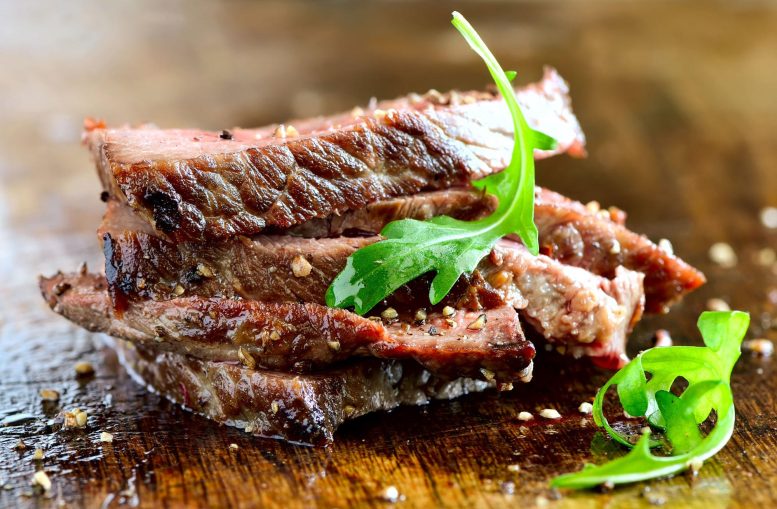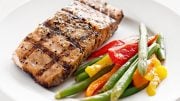
Scientists found that two-ounce-equivalents (oz-eq) of animal-based protein foods provide greater essential amino acids (EAA) bioavailability than the same quantity of plant-based protein foods. The study challenges the Dietary Guidelines for Americans (DGAs) which suggest these protein sources are nutritionally equivalent.
Consuming equal ounce-equivalent portions of animal-based and plant-based protein foods, as per the Dietary Guidelines for Americans, leads to varying levels of essential amino acid bioavailability in both young and older adults.
Protein derived from two-ounce-equivalents (oz-eq) of animal-based foods offers higher bioavailability of essential amino acids (EAA) than the same amount from plant-based sources, according to scientists at Purdue University.
The protein quality of a food or meal (i.e., the EAA content of a meal) is a major factor in determining how the body can use amino acids for muscle and whole-body protein building.
The Dietary Guidelines for Americans (DGAs) puts an emphasis on consuming a variety of protein foods based on ounce-equivalent portions with similar nutritional content. One oz-eq equals one ounce of meat, one whole egg, 0.25 cups of beans, or 0.5 ounces of nuts.
“The basis for the DGAs stating that these protein foods are ‘equivalent’ and have ‘similar nutritional content’ is unclear,” suggests Dr. Wayne Campbell, primary investigator on this study and professor in the Department of Nutrition Science at Purdue University.
Protein foods differ in their energy and nutrient content, including protein quantity and quality (see Table 1), he adds. Additionally, there is limited information on how eating oz-eq amounts of protein foods from different sources as part of a mixed meal impacts the body’s ability to digest and use protein.
Table 1. Energy and macronutrient contents of the test meal and protein food sources, and essential amino acid content of the protein food sources.
| Energy (kcal) | Fat (g) | Carbohydrate (g) | Protein (g) | EAA (g) | |
| Test meal | 218 | 11.5 | 25.8 | 6 | 2.09 |
| Lean pork loin (2 oz-eq) | 73 | 1 | 0 | 14 | 7.36 |
| Whole eggs (2 oz-eq) | 145 | 10 | 0 | 12.5 | 5.38 |
| Black beans (2 oz-eq) | 113 | 0.5 | 20 | 7.5 | 3.02 |
| Almonds (2 oz-eq) | 161 | 14 | 6 | 6 | 1.85 |
Adapted from Connolly et al. (2023); The quantity of protein for each trial includes the protein from the test meal: lean pork (20 g); whole eggs (18.5 g); black beans (13.5 g); and almonds (12 g). The total quantity of EAA for each trial includes the EAA from the test meal: lean pork loin (9.45 g); whole eggs (7.47 g); black beans (5.11 g); and almonds (3.94 g). EAA—essential amino acids.
This includes within populations that may be vulnerable to a lack of variety in their protein choices, like younger adults, and who may be under-consuming high-quality sources of nutrient-dense protein despite greater nutrient needs, such as older adults.
Therefore, scientists sought to test if eating two oz-eq portions of animal-based versus plant-based protein foods as part of a mixed whole foods meal differently impacted EAA bioavailability for protein building in these populations.
Study Overview
Two cross-over randomized controlled trials were performed on 30 otherwise healthy young adults and 25 older adults. Each study participant completed four separate 300-minute trials, with each trial separated by a minimum of three days.
The study investigators were blinded to the order the participants completed their protein foods assignments until all participants finished their testing and the results were analyzed.
During trial periods, study participants reported to the clinic to eat a standardized meal with two oz-eq of either animal-based protein foods (e.g., unprocessed lean pork loin, scrambled whole eggs) or plant-based protein foods (black beans, raw sliced almonds).
Blood samples were taken at baseline and 30, 60, 120, 180, 240, and 300 minutes after eating to determine EAA bioavailability as well as blood sugar and insulin levels.
Results At A Glance
“In line with our hypothesis before starting this study, consuming meals with two oz-eq of animal-based protein foods resulted in more EAAs in the bloodstream compared to meals with two oz-eq of plant-based protein foods in both young and older adults, separately and combined,” explains Dr. Gavin Connolly, clinical trials project manager and research associate in the Department of Nutrition Science at Purdue University. Also, there were no differences in EAA bioavailability between young and older adults, he adds.
This means animal-based proteins (from unprocessed lean pork loin and scrambled eggs) more effectively provide EAAs, which is linked with the ability of our bodies to build body protein or muscle, notes Dr. Connolly. “This is an important consideration for muscle and whole-body health and physical function across the life course,” he suggests.
Additional findings from this study include:
- Lean pork resulted in greater EAA bioavailability than eggs in young adults or older adults, separately or combined.
- There were no differences in EAA bioavailability between black beans and almonds.
- There were no differences in EAA bioavailability between young and older adults.
There were limitations in the current study.
“Portion sizes of the protein foods in the study likely does not truly reflect the amounts consumed on a meal-to-meal or weekly basis by young or older adults,” according to Dr. Connolly. Additionally, there were no direct measures of changes in muscle protein synthesis or whole-body protein balance in response to the meals containing the different protein foods, he explains.
Additional research is needed to better understand how animal versus plant-based protein foods may influence muscle and whole-body health across the lifespan to promote healthy aging.
Public health nutrition implications:
The study authors suggest the findings from this research may have public health nutrition guidance implications and serve as an important resource for future DGAs to reevaluate the appropriateness of equating different protein sources in the protein foods group on an oz-eq basis across the lifespan.
“These results are also pertinent to the DGA’s recommendation to consume more plant-based foods,” adds Dr. Campbell.
While there are health benefits to consuming more plant-based foods, guidance on the importance of nutrient-dense animal-based protein foods which are high-quality protein sources is important information to incorporate when providing dietary recommendations, he explains.
References: “Effects of Consuming Ounce-Equivalent Portions of Animal- vs. Plant-Based Protein Foods, as Defined by the Dietary Guidelines for Americans on Essential Amino Acids Bioavailability in Young and Older Adults: Two Cross-Over Randomized Controlled Trials” by Gavin Connolly, Joshua L. Hudson, Robert E. Bergia, Eric M. Davis, Austin S. Hartman, Wenbin Zhu, Chad C. Carroll and Wayne W. Campbell, 25 June 2023, Nutrients.
DOI: 10.3390/nu15132870
“Quality of meal protein determines anabolic response in older adults” by Il-Young Kim, Yun-A. Shin, Scott E. Schutzler, Gohar Azhar, Robert R. Wolfe and Arny A. Ferrando, 6 October 2017, Clinical Nutrition.
DOI: 10.1016/j.clnu.2017.09.025
“Metabolic Evaluation of the Dietary Guidelines’ Ounce Equivalents of Protein Food Sources in Young Adults: A Randomized Controlled Trial” by Sanghee Park, David D Church, Scott E Schutzler, Gohar Azhar, Il-Young Kim, Arny A Ferrando and Robert R Wolfe, 9 March 2021, The Journal of Nutrition.
DOI: 10.1093/jn/nxaa401
“Essential Amino Acids and Protein Synthesis: Insights into Maximizing the Muscle and Whole-Body Response to Feeding” by David D. Church, Katie R. Hirsch, Sanghee Park, Il-Young Kim, Jess A. Gwin, Stefan M. Pasiakos, Robert R. Wolfe and Arny A. Ferrando, 2 December 2020, Nutrients.
DOI: 10.3390/nu12123717
This research was funded by the National Pork Board and the American Egg Board—Egg Nutrition Center.









Since the protein varies, the amino acids should also varies. Redundant amino acids might be also important to some people which need to take precisely rationed amino acids.
This research was funded by the National Pork Board and the American Egg Board—Egg Nutrition Center.
Very well caught! Also, two of the researchers had extreme conflicts of interest, receiving funding from “Beef Checkoff, Pork Checkoff, North Dakota Beef Commission, Barilla Group, Mushroom Council, and the National Chicken Council”. This study’s findings cannot be relied on. I’m not questioning the researchers’ integrity, but it’s human nature to subconsciously please the hand that feeds.
That said, the conclusions of the study can still be valid, only needing nonconflicted reproduction. I’ll cite the review “Determinants of amino acid bioavailability from ingested protein in relation to gut health” (PMC7752214) which cited no conflict, and cited some good studies, with similar results finding animal proteins dramatically more bioavailable.
Politely, it’s evolving research, especially very recently regarding protein bioavailability. I’m not keen on any nutritional science, and it’s even becoming political lately. Eat what feels good, live life.
I mean, the actual byline(!) is the National Pork Board. This should be marked as an ad, not an article.
Unless I missed something, I’m not seeing anything about combining plant based foods to create a complete protein, s/a beans and rice. I also didn’t see anything about the grains that are a complete protein within themselves, s/a quinoa,and amaranth. This study seems completely skewed.
So you must also distrust Climate change right? 100% of the science is funded and preformed by organizations that make billions off it. Climate change is the largest most profitable industry in world history.
Except fossil fuels are literally the most profitable industry in the world,and have been for a long time. No one is making any kind of near the amount of money, or margins of profit, off of “climate change” as they are from fossil fuels. In addition, all climate studies, even those funded by pro-fossil fuel interests, e.g., Koch Industries, with hand picked climate change skeptical scientists, have found the same results: the earth is getting warmer and human caused greenhouse gas emissions are primarily to blame.
Pasture raised meats, particularly beef, have so many more easily digestible essential trace minerals and amino acids than any plant source; this is scientific fact. Non corporate animal farms are so very beneficial for the environment, as they replenish the soil. The whole plant based diet routine is garbage and false information.
Could the study results be skewed to continue the funding from the not-so-objective supporting organizations? I don’t think it is fair to compare just the protein and miss the other aspects like fiber and gut supporting nutrients in other foods. I believe everything on moderation has a place although I don’t necessarily agree animal based products are as healthy when that is what is the main portion of the meal.
Funded by the Pork checkoff and the Egg board? This is not science it’s propaganda.
“This research was funded by the National Pork Board and the American Egg Board—Egg Nutrition Center.” O, dear, I wonder if they would have come to a different conclusion had it been founded by ´Black Beans Unlimited and The infamous Almond Producers association.
The myth that we need the amounts of protein being promoted by mainstream media is just that, a myth!
Not only can one fulfill one’s protein requirements not to mention build muscle as shown my many top athletes on a whole food plant based diet but one also gets essential requirements, especially fibre ( which btw accounts for the lower protein density in plant foods ) which is entirely absent from animal protein. And, let’s also not forget that whole plants are very low in fat thereby helping to revert up to 80% of the chronic diseases.
I meant “prevent” up to 80% of all chronic diseases but my spell checker has a mind of its own.
EAAs and BCAAs do contribute to muscle growth, but the high quality protein myth is a myth because GROWTH is not always good. These AAs trigger the same growth factors that spur cancer tumor growth, which is why animal protein consumption is linked to higher cancer incidence.
Also: “This research was funded by the National Pork Board and the American Egg Board—Egg Nutrition Center.”
All three sources examined here are bs seemingly designed to confuse people:
1) Once-equivalents (which I never heard of) that don’t match total amount protein seem bogus.
2) The pointless “research study” funded by pork and egg industry that serves no other purpose other than to imply that animal protein is superior. The “investigators” and Purdue should be ashamed for conducting this kind of “research”.
3) This click-bait article and its misleading title.
Research funded by the National Pork boaed,as others have noted;enough said.🤣👌I’m done with Scitechdaily.com.🫡
Hi Damon,
Thank you for your feedback. To clarify, the study was funded by the National Pork Board, not SciTechDaily. We recognize the concerns regarding research funded by industry-specific boards. That’s why we made sure to disclose the funding sources in our article.
Best,
Colin
SciTechDaily.com
Don’t worry about it Colin. The funding conflict is an issue for the study, not for SciTechDaily. It doesn’t dismiss the study’s conclusions, but does subtract its credibility. Funding is put right on the article, and you’ve done an important job in that. I’m impressed you’re reading and considering comments too, excellent, but harrowing I’m sure, and I’d certainly be guilty of making that difficult. Nobody should stop reading SciTechDaily over this, and from the comments it actually seems more engaging.
I’m afraid the study taps into people’s personal choices and politics, and people easily lose impartiality in defending their identity. Compare to last month’s “Good for Your Health and the Climate: The Power of a Plant-Based Diet”, funded
by Lundbeck which sells pills for mental disorders (mainly depression), which has not a single comment. In other words, you’ve unhinged the Vegan Brigade who have come to reflexively shout the same thing ten times so far. notsofast pointed it out first, usefully, but all the offended repetition isn’t charming.
So you get to eat more beans, sounds good to me!
Sounds like YOU are biased against vegans.
I am, but only against the ones commenting here. Even more of them have said the exact same thing since then, obliviously adding nothing but noise. Some of my best friends are vegetables, but exclusively eating them seems to make people repetitious. You read the comments before commenting though Andrea so you’re already cool.
While we can be skeptical of the results based on the funding source, remember that people and organizations seldom pay for research that they don’t have a vested interest in.
This study verifies precisely why many people choose plant protien. Meat protien is more complete, providing amino acids in much higher amounts. This intern activates growth pathways ie Mtor and igf1 driving growth. Cancer is accelerated cellular groth. Plant protien allows for sufficient amounts of protien but doesn’t activate growth in the way that meat does.
And sunlight also causes cancer, yet it’s the sunlight that plants need to grow, therefore plants grown on sunlight must cause more cancer than those like mushrooms grown in the dark.
This study verifies precisely why many people choose plant protien. Meat protien is more complete, providing amino acids in much higher amounts. This intern activates growth pathways ie Mtor and igf1 driving growth. Cancer is accelerated cellular groth. Plant protien allows for sufficient amounts of protien but doesn’t activate growth in the way that meat does.
These comments are indicative of our society. Just cannot stand it that people live differently. I choose to eat beef, pork, fish & eggs, and now come under the attack of plant eaters. You all have too much free time, and how do you spend it? Attacking others. What a waste.
I agree with you. I love animal base protein sources. Don’t mind them.
T. Colin Campbell, respected nutritional scientist points out the body disassembles proteins and reuses essential amino acids. Thus macro amounts of essential amino acids are not as important as assumed by this study. Bio-availability is one point in a very complex process. “The body does the calculus “.
Seems like you are projecting heavily. You chose to read this entire article, the comments, add your name and thoughts. Perceiving random comments directed at the ether as a personal attack. What a waste.
Interesting. Are you really under attack, or just wanting to feel persecuted?
Exactly. I was just stating science. Eat all the meat that you want.
Major conflicts of interests: This work was supported by grants from the National Pork Board (A.A.F.), Egg Nutrition Center (A.A.F.), Adesso LLC (A.A.F.), Beef Checkoff (NCBA; R.R.W.), and Zespri Group Limited through Massey University (R.R.W.).
Except for a handful of times, I have not eaten meat in over 52 years. I can easily walk six miles, ride for a dozen miles or more, & do four miles on an elliptical in an hour. I seldom have pain in my body & am free of disease. I work full time in IT. The supposition that one needs meat as a protein to prosper is an old trope. That is a lie. I believe that eating meat is a detriment to health, a form of animal abuse, and its production harms the environment and contributes to climate change.
Vegetarians average an extra 8 years of longevity and are healthier towards the end. 80% of my meals are vegan. Methionine is an “essential” amino acid mainly from nuts, beef, lamb, cheese, turkey, pork, fish, shellfish, soy, eggs, dairy, and beans. Methionine restriction extends lifespans.
I’m glad other readers spotted the blatant subjectivity of this article, but then again its bias was less subtle than a parade float. My first instinct, based on this and related articles is that the “research” was funded by animal agribusinesses. They’re losing consumers who are becoming more informed and conscientious, and the best tactic for remaining dominant in their respective industries is to infuse public opinion with doubts about the myriad benefits from consuming more plant-based whole foods. Guys, get over it!
It’s like the whole article is a joke with the last sentence (about funding) as the punchline.
This information is garbage. Very disappointing that this was even given consideration for publishing.
Traditional combinations of plant proteins make a balanced amino acid menu that is cheaper, healthier, more environmentally responsible and kinder than animal proteins.
Legumes can be combined with grains, nuts, or seeds to make complete protein, and many traditional cuisines provide delicious examples.
Examples:
Peanut butter sandwich on wheat bread (North American)
Tacos with beans and wheat tortilla (Americas)
Bean chili with cornbread (Southwestern US America)
Falafel (chickpeas) with pita bread (Southwest Asia–Mediterranean)
Tofu with sesame seeds (Southeast Asia-China)
Hummus made from chickpeas and tahini (Southwest Asia-Mediterranean)
Trail mix with peanuts, seeds and nuts (Backpackers)
Tortillas with refritos (Americas)
Lentils with chapatis (South Asia-India)
Injera(Teff) with Shiro (chickpeas), Misir Wot (lentils), Kik Alicha (split peas) (Ethiopia, Eritrea)
Sorghum or Millet with Beans (Subsaharan Africa)
This study’s potential merits are overshadowed by concerns of funding bias, with backing from organizations such as the Pork Board, Egg Nutrition Center, and Beef Checkoff. While it’s understandable that animal agribusiness has a vested interest, the findings could be perceived as an attempt to undermine the adoption of healthier plant-based alternatives in the market. SciTechDaily and similar publications should consider better highlighting these affiliations up-front (perhaps even in the title), allowing readers to discern the possible bias behind such research. In a landscape where misinformation is prevalent, it’s crucial that scientific platforms prioritize transparency for the sake of public trust, upholding accuracy and impartiality.
It doesn’t take research to understand that the amount of Amino Acids solely depends on the composition of the plant based alternative. Combining soy and quinoa already delivers all essential amino acids the body needs. Another important consideration is the amount of digestive time it takes to breakdown pork VS plant based alternatives. Pork takes on average 4-5 hours to digest whereas soy based alternatives take only 2 hours in comparison. So not only does it save your body energy but its also better for the environment, despite it also needing a lot of water to grow.
Meat requires even more water than plants, as farm animals eat plants which require water, but are not that efficient in converting plant protein to meat – must think of the lifetime drinking water that most animals require.
Pork propaganda.
The nutritional difference is miniscule compared to the difference in environmental and ethical costs. They deftly avoid those considerations.
Vegetarians live longer (study with over 15,000 partcipants): Dietary carbohydrate intake and mortality: a prospective cohort study and meta-analysis
Open AccessPublished:August 16, 2018 DOI:https://doi.org/10.1016/S2468-2667(18)30135-X
This article is BS. There are world-class athletes that are vegan. Watch a documentary called Game Changers. This is the problem with not only the nutrition and health industry but also the medical industry. The pork, beef, chicken, and egg industry pay to have studies done to put their product better light. If you look at the countries with the highest meat and dairy consumption they are the countries with the highest rates of cancer.
Just a coincidence it was funded by the National Pork Board and the American Egg Board, and they used pork and eggs in their samples instead of beef, chicken, fish, dairy…?
Just so we are clear, for all the people about to quote just the hypothesis of this study. The populace who do not want to consume meat need only have an extra helping of plant base, protein, an extra spoon of beans etc… Sweet!
“ This research was funded by the National Pork Board and the American Egg Board—Egg Nutrition Center.”
Enough said.
Only the fool will give credit to a Meat industry advertising masked as a nutrition study.
What a suprise! a study funded by the pork and egg industry finds in favour of pork and eggs😱😱😱😱
I’m so shocked😭
This is such a pointless article. It still doesn’t change the fact that meat is murder!
Why don’t they compare the protein content to soybeans 🤔
Unless I missed something, I’m not seeing anything about combining plant based foods to create a complete protein, s/a beans and rice. I also didn’t see anything about the grains that are a complete protein within themselves, s/a quinoa,and amaranth. This study seems completely skewed.
Don’t have to, all that l have to say is in the comments, including the fried
🥚s and ham funders of the study. I’ll stay w/my main base of beans,seeds and grains.
I am a 78 y.o. male. I was raised as a Jew eating food cooked with chicken fat and meat I used to eat raw hamburger without any additives. I left home to go to college stopped eating hamburger changed to eating fish.
My medical checkups report that my heart is LIKE baby, my blood pressure 90 over 70, resting pulse is in the 55 range, so I am healthy for a 78 year old. I do not bother relying biased repo type us on nutrition.
This research was funded by the National Pork Board and the American Egg Board—Egg Nutrition Center
And you choose to publish this “study”,, aren’t you involved i’m promoting their agenda,,, you guys are becoming untrustworthy if you promote one lobby,,, suggest you highlight,, at the commencement of the article,the fact that this study was sponsored or funded by a organization
What a joke.
This just shows how desperate these butchers are.
Just look at the muscles a horse or cow have and then tell me how is plant based protein worthless
Nevermind horses and cows. What about rhinos and elephants!
I do my own research and trust my own experiences on what’s best for me. I do much better on meat with less effort. If your Vegan good for you, if your carnivore good for you. As long as you don’t push your beliefs on me I’m good. I eat 90% meat and a little bit of vegetables, no fruit. This has been the best I ever felt and the healthiest I’ve been. You gotta research keep an open mind and try different things. See what works best for you.
Scientists at Purdue university…stopped reading from there. #dopesick
Nothing against meat eating but if plant based protein makes my kidneys work like they never did I don’t care ill go vegan .. the problem is the amino acides that I still need to find ways to get what I need but there’s a lot of people living only being vegan so I think I’m OK.. being vegan is almost like a cure for certain stages of ckd … soo yes I love Angus and all of that but grass and soy here I come
The whole study starts with a huge assumption that is dubious at best. The assumption being that more protein and more EAAs is ideal or goalworthy.
More protein is link with more inflammation. High protein intake is linked with kidney hyperfiltration and kidney damage. High protein is linked with increased growth factors- the ones linked to cancer. Higher protein intake is also linked to a lower intake of micronutrients and phytochemicals. Not good.
The people who live the longest on the planet, aka the blue zones, all eat a diet low in these “quality” protein sources. I’ll stick to in vivo data instead of this theory-crafting, thanks
Look, my gf has been a vegan for years. Do you know what she has to do to maintain a regular heartbeat? Supplement, supplement, supplement. It’s ridiculous. I tried plant based protein like veggie burgers. Have you read the ingredients? OMG, there’s so many chemicals in them and the method in which the make the “meat” is insane. Give me meat – real meat!! I’m healthier I don’t care wglhat the vegans and vegetarians say. I don’t need to supplement in order for my heart to have a regular heartbeat!!!
Most people (veggie or not) do not get enough B12, so there is one supplement you should take. Depending on your girlfriends diet, she may be taking ‘good to have’ supplements, like resveratrol, D3, Collagen, or a NAD+ boost. She doesn’t need these to keep her heart working, she’s just taking good care of herself so that she’ll be healthy and looking good for as long as possible. Veggie burgers, and the like, are (obviously) processed foods. While they’re still healthier for your heart than meat, they’re no match for eating more plant based whole foods. You’re likely still young, and your heart seems to be working just fine – but regardless of the emotions surrounding your need for meat, it is most certainly reducing the function of your arteries burger by steak by fry by chicken tender. You may not recognize it, but your GF is a warrior – standing for what she knows is right, in the face of ridicule and bigotry. Respect and support can go a long way when you have differences of opinion. Good luck.
Most people (veggie or not) do not get enough B12, so there is one supplement you should take. Depending on your girlfriends diet, she may be taking ‘good to have’ supplements, like resveratrol, D3, Collagen, or a NAD+ boost. She doesn’t need these to keep her heart working, she’s just taking good care of herself so that she’ll be healthy and feeling good for as long as possible. Veggie burgers, and the like, are (obviously) processed foods. While they’re still healthier for your heart than meat, they’re no match for eating more plant based whole foods. You’re likely still young, and your heart seems to be working just fine – but regardless of the emotions surrounding your need for meat, it is still most certainly reducing the function of your arteries burger by steak by fry by chicken tender. You may not recognize it, but your GF is a warrior – standing for what she knows is right, in the face of ridicule and bigotry. Respect and support can go a long way when you have differences of opinion. Good luck.
Julian – Most people (veggie or not) do not get enough B12, so there is one supplement you should take. Depending on your girlfriends diet, she may be taking ‘good to have’ supplements, like resveratrol, D3, Collagen, or a NAD+ boost. She doesn’t need these to keep her heart working, she’s just taking good care of herself so that she’ll be healthy and feeling good for as long as possible. Veggie burgers, and the like, are (obviously) processed foods. While they’re still healthier for your heart than meat, they’re no match for eating more plant based whole foods. You’re likely still young, and your heart seems to be working just fine – but regardless of the emotions surrounding your need for meat, it is still most certainly reducing the function of your arteries burger by steak by fry by chicken tender. You may not recognize it, but your GF is a warrior – standing for what she knows is right, in the face of ridicule and bigotry. Respect and support can go a long way when you have differences of opinion. Good luck.
This is mostly looking at protein quality and not the whole system. Meat is healthy and has iron and B12, but other research shows that people who eat more plant-based foods than animal-based foods live longer, healthier lives. It doesn’t need to be either or.
I see that I’m not the only one with a problem with this article. It is a attack on my intelligence.The one problem that I have with this article is that meat provides a full amino acid chain and plants provide only a partial amino acid chain, and most of the plants that we get from local stores does not have any nutritional value to sustain a person with a proper level of health that they need. Don’t get me started about what happens with food and it’s genetically modified or saturated by chemicals that are harmful for our bodies. This makes meat a more superior source of protein.